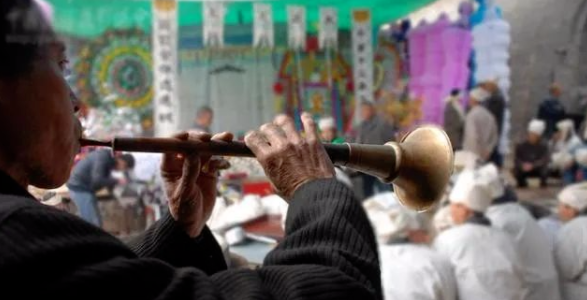All kinds of musical instruments, suona is the king, either ascending to heaven or worshipping the church!
Suona plays an important role in our country's musical instruments and is the most representative national wind instrument in modern times. According to the records on Baidu Encyclopedia, in the third century AD, with the opening of the Silk Road, suona was introduced into my country from Eastern Europe and West Asia, and developed into various forms of suona.

Suona plays an indispensable role in the folk. As mentioned in the opening chapter, the suona is the king, and the sound of the suona is irreplaceable in the event of marriage, funeral, and marriage.
There is a folk saying that "a thousand-year-old pipa, a ten-thousand-year zheng, an erhu pulls for a lifetime, and the suona sounds at the end of the play, the first time you hear the suona sound, you will be the person in the coffin."
There is also "the whole play ends when the suona sounds, the music starts, the cloth covers, and the whole village's elders and children wait for the food to be served, walking and carrying, followed by a piece of white."
At the end of the song, people are scattered, and the curtain of life comes to an end, accompanied by the sound of suona, the solemn and sad feelings are vividly reflected, and the grief is full of tears.
Therefore, if you are in the countryside, you don't have to go out at all. When you hear the sound of the suona, you will know whether it is a happy event or a happy event.

However, this year, many rural villages rarely hear the sound of "suona" on white affairs. Could it be that fewer people have passed away in the past two years? But that's not the case, probably more than before. As for the sound of the "suona" during funerals, there are three main reasons, according to Murakami, who specializes in the country stage and plays and sings for weddings and weddings.
First, affected by the epidemic
According to him, not only white events, but also happy events. In the past two years, the outbreak of the epidemic in the country has not been fixed at any time. The Spring Festival period is the time of the most happy events every year. Migrant workers cannot return to their hometowns; moreover, every time the epidemic spreads, it is necessary to publicize the delay of red events and the simplicity of white tasks. Basically, there are fewer and fewer weddings and funerals in rural areas.
Therefore, in rural white affairs, drum bands are rarely invited to play suona. In some places, the number of participants is even limited, and the number of tables for banquets is stipulated. No matter how well the suona is played, it is helpless against the epidemic.

Second, the reason for changing customs
To promote the change of customs and establish a new style of civilization, slogans were posted on the gate of his house, and he also received a letter of responsibility and a letter of proposal from the relevant departments, so the leader of the folk band in Murakami felt that his spring was gone.
Rural weddings, funerals, marriages, childbirth, and university entrance exams are all impossible to do. In some villages, the village rules and regulations even stipulate the amount of gift money for a family.
And recently, specific requirements have been given for party members and cadres to participate in banquets. As long as they violate the regulations, they will be investigated and punished. This has also led to more and more simple weddings and funerals in rural areas in the past two years.
Even the "suona" in white affairs is no longer useful. After all, simple funerals are now advocated, and there will be no more pink girls who play and dance at funerals.

Third, funeral reform
Burials and forced cremations are prohibited, and rural areas are not spared. With the advancement of funeral and interment reforms, coffins are not allowed in many places. Fire paper, paper money, paper people and paper horses have also been marked as feudal and superstitious items, and production and sales are prohibited. ,Buy.
In rural areas, graves are basically not allowed to be raised. Of course, burials must be blocked and sparsely combined. On the one hand, burial is prohibited, and on the other hand, people have to find a good cemetery. Therefore, a lot of cemetery land has been released, and many cemeteries have been built around the countryside. Few people go directly to the cemetery after being cremated, and only hold a simple farewell ceremony. There are no longer some of the original funeral procedures in the countryside, so there is no need for suona players.
For the above reasons, people hear less "blowing" in Bai Shi. At present, the Murakami folk art team mainly focuses on happy events and opening ceremonies. Although Bai Shi receives less, there are still some. After all, we respect tradition. It is difficult for the rural areas to make much change at one time.
Finally, have you noticed that Murakami's "suona" sound has decreased recently?
 渝公网安备 50010702504639号
渝公网安备 50010702504639号